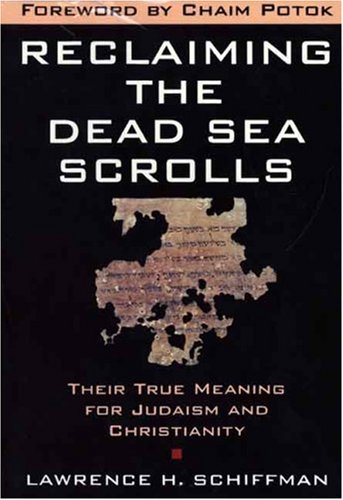Reclaiming the Dead Sea scrolls :
by Schiffman, Lawrence H.
Edition statement:1st ed. Published by : Doubleday, (New York:) Physical details: xxvii, 529 p. : ill., maps ; 26 cm. ISBN:0385481217. Year: 1995 List(s) this item appears in: Archaeology Books| Item type | Current location | Collection | Call number | Status | Date due | Barcode | Item holds |
|---|---|---|---|---|---|---|---|
 Books
Books
|
HIPSIR Library General Stacks | BM Judaism |
BM 487 SCH (Browse shelf) | Available | 107096 |
Includes bibliographical references (p. 471-511) and index.
Foreword / Chaim Potok -- Pt. I. Discovery and Disclosure: Liberating the Scrolls. 1. Shepherds and Scholars: Secrets of the Caves. 2. Scholars, Scrolls, and Scandals. 3. The Archaeology of Qumran -- Pt. II. The Community at Qumran. 4. Judaism, Hellenism, and Sectarianism. 5. Origins and Early History. 6. The Character of the Community. 7. Leadership. 8. Women in the Scrolls. 9. Faith and Belief -- Pt. III. Closing the Canon: Biblical Texts and Interpretation. 10. Bible, Canon, and Text. 11. Apocryphal Literature. 12. Wisdom and the Mysteries of Creation. 13. Biblical Interpretation. 14. The Prophets in the Hands of Men -- Pt. IV. To Live as a Jew. 15. The Theology of Jewish Law. 16. The Enigma of the Temple Scroll. 17. The Law of the Sect. 18. Prayer and Ritual -- Pt. V. Mysticism, Messianism, and the End of Days. 19. The Messianic Idea. 20. The Community at the End of Days. 21. The "Pierced Messiah" and Other Controversial Texts. 22. Mysticism and Magic.
Pt. VI. Sectarianism, Nationalism, and Consensus. 23. Israel and the Nations. 24. Jerusalem, the Holy City. 25. The Decline of Sectarianism and the Emergence of Rabbinic Judaism.
This in-depth examination of the Dead Sea Scrolls reveals their true heart: a missing link between ancient and modern Judaism. Because the Dead Sea Scrolls include the earliest known manuscripts of the Bible as well as Jewish documents composed just after the Hebrew biblical period, they contain a gold mine of information about the history of Judaism and the early roots and background of Christianity.
Schiffman refocuses the controversy from who controls access to the Scrolls today to what the Scrolls tell us about the past. He challenges the prevailing notion of earlier Scrolls scholars that the Dead Sea Scrolls were proto-Christian, demonstrating instead their thorough-going Jewish character and their importance for understanding the history of Judaism.
.
Schiffman shows us that the Scrolls library in the Dead Sea caves was gathered by a breakaway priestly sect that left Jerusalem in the aftermath of the Maccabean revolt. They were angry that their fellow Sadducees in the Temple were content to accommodate themselves to the victorious Hasmonaean rulers who had embraced the views of the Pharisees - forerunners of the talmudic rabbis. This loyal opposition, a band of pious Sadducee priests, retreated to the desert, taking up residence at Qumran.
From this group, the Dead Sea sect developed. In addition to its own writings, the sect gathered the texts of related groups, placing them in its library along with numerous biblical and apocryphal texts. Those other works, some previously known, others unknown, were preserved here in the original Hebrew or Aramaic. Numerous prayer texts, either from the Dead Sea sect or other Jewish groups, were also preserved.
Reclaiming the Dead Sea Scrolls puts into perspective the triumph of rabbinic Judaism after the Jewish military defeat by Rome. Readers will appreciate this lost chapter of Judaism, not only for its historical insights, but also for its parallels with modern Judaism on such issues as religious pluralism, sectarianism, Jewish identity, and spiritual questing.
Finally, Schiffman maintains that a true understanding of the Scrolls can improve relations between today's Jewish and Christian communities. Across the centuries, the Scrolls speak to us about our common roots, showing precisely how Christianity emerged from currents in ancient Judaism - currents that were much more widespread in that period than we previously imagined.



There are no comments for this item.